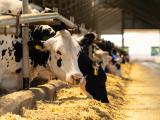Jun 3, 2004 (CIDRAP News) The General Accounting Office (GAO) has urged federal agencies to step up their efforts to determine if the use of certain antibiotics in animals endangers human health by making bacteria resistant to those antibiotics.
In a report released last week, the GAO said the Food and Drug Administration (FDA) should speed up its risk assessments to determine whether it should restrict the use in animals of antibiotics considered critically important to human health.
In addition, the GAO said research on the human health risk is crippled by a lack of data on the types and amounts of antibiotics used in animals. The agency recommended that the US Department of Agriculture (USDA) and the Department of Health and Human Services (HHS) work together to collect the needed information.
"Although they have made some progress in monitoring antibiotic resistance, federal agencies do not collect the critical data on antibiotic use in animals that they need to support research on the human health risk," the report states.
The GAO, Congress's investigative arm, spent a year preparing the report. It was requested by three senatorsOlympia J. Snowe, R-Me.; Tom Harkin, D-Iowa; and Edward M. Kennedy, D-Mass.
The agency concluded that antibiotic-resistant bacteria have been transferred from animals to humans and that this transfer appears to pose significant risks to human health. Some studies have produced evidence of links between changes in antibiotic use in animals and bacterial resistance to antibiotics in humans. Further, genetic studies of bacteria have established that antibiotic-resistant Campylobacter and Salmonella are transferred from animals to humans, the report says.
Many studies suggest that the use of antibiotics in animals poses risks to human health, but a few studies indicate that the health risks are minimal, the report says.
The document notes that the FDA has laid out a "risk assessment framework" determining the human health risks. The agency is using the framework in reviewing both currently approved animal antibiotics and manufacturers' applications for approval of new ones.
However, the GAO said, the approved drugs reviewed so far are not the ones the FDA considers critically important to human health, and the reviews have taken at least 2 years to complete. "Therefore it may be some time before FDA completes its reviews of critically important drugs in order to determine if enforcement action to protect human health is warranted," the report says. The agency recommends that the FDA accelerate its reviews of antibiotics that are used in animals and are important for human health.
Concerning the need for data, the GAO says federal agencies have expanded their research on antibiotic resistance related to antibiotic use in animals, but it is too early to judge the effectiveness of their efforts to reduce the risk to human health. The FDA, CDC, and USDA have increased their surveillance and research on antibiotic resistance in animals and humans in recent years.
However, the FDA "is not collecting data on antibiotic use in animals, and USDA's data collection activities are limited to a few swine farms," the report says. It suggests that the agencies gather information on the types and quantities of antibiotics sold for animals, the purpose of their use (disease treatment or growth promotion), and the species in which they are used.
In Denmark, collection of detailed data on antibiotics given to animals has enabled scientists to trace the effects on resistant bacteria in humans and to devise strategies to minimize the health risks, the GAO says. The agency recommends that the FDA and USDA together develop and implement a plan to collect the needed data. The report acknowledges that this will cost money but says it should not be excessively expensive, because existing FDA and USDA programs can provide a framework that can be expanded to begin gathering the information.
The report also notes that the FDA has moved to bar the use of the fluoroquinoline antibiotic enrofloxacin in poultry because of evidence that fluoroquinoline use in animals has caused the transfer of resistant pathogens to humans. However, the drug has remained on the market the past 3 years because the manufacturer has challenged the FDA move.
The United States differs from some of its key trading partners in the use of antibiotics in food animals, the report notes. While the United States and Canada allow some drugs that are important in human medicine to be used for growth promotion, the European Union and New Zealand have banned this practice. In addition, the EU plans to ban the use of any antibiotic for growth promotion by 2006. These policy differences have not significantly affected US meat exports so far, but that could change, the report says.
The USDA and HHS, on reviewing a draft of the GAO report, generally agreed with it, the GAO says. HHS officials said that pharmaceutical companies have the most useful data on antibiotic use in animals. Current regulations would have to be revised to put the data that companies have to report to the FDA in a more useful format for research on antibiotic resistance, the officials said.
See also:
GAO report "Antibiotic Resistance: Federal Agencies Need to Better Focus Efforts to Address Risk to Humans from Antibiotic Use in Animals"
http://www.gao.gov/new.items/d04490.pdf
Mar 18, 2004, CIDRAP News story, "FDA closer to banning enrofloxacin use in poultry"














